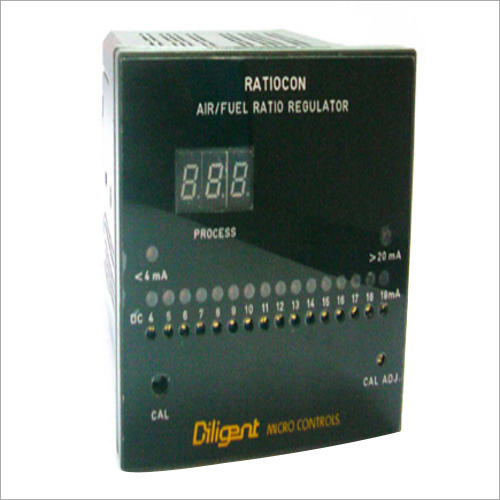- Home Page
- Company Profile
- Our Products
- Contact Us
Air/Fuel Ratio Regulator
Product Details:
- Power Supply Electric
- Usage Industrial
- Color Green
- Warranty Yes
- Click to View more
X
Air/Fuel Ratio Regulator Price and Quantity
- 1 Piece
Air/Fuel Ratio Regulator Specification
- Yes
- Electric
- Industrial
- Green
Air/Fuel Ratio Regulator Trade Information
- 7 Days
Product Description
An Air/Fuel Ratio (AFR) regulator, also known as an AFR control module or AFR sensor, is a component used in internal combustion engines to regulate the mixture of air and fuel for combustion. It ensures that the engine operates within the desired air-fuel ratio range to optimize performance, fuel efficiency, and emissions.
Key points about the Air/Fuel Ratio Regulator:
1. Function: The AFR regulator's primary function is to adjust the amount of fuel delivered to the engine in relation to the amount of air entering the combustion chamber. This adjustment is essential for achieving complete and efficient combustion.
2. Modern Systems: In modern vehicles, AFR regulators are typically part of the electronic fuel injection (EFI) system. They work in conjunction with oxygen sensors (O2 sensors) and the Engine Control Unit (ECU) to monitor the oxygen content in the exhaust gases and adjust the fuel injection accordingly.
3. Oxygen Sensors: Oxygen sensors, located in the exhaust system, measure the oxygen levels in the exhaust gases. This information is used by the AFR regulator and ECU to determine whether the engine is running too lean (excess oxygen) or too rich (insufficient oxygen).
4. Closed-Loop Control: Most modern engines operate in a closed-loop control system, where feedback from the oxygen sensors is used to continuously adjust the air-fuel mixture in real-time. This allows the engine to maintain the desired AFR, which is typically around 14.7:1 for gasoline engines.
5. Benefits: Maintaining the correct AFR offers several benefits, including improved fuel efficiency, optimized power output, reduced emissions, and prevention of engine damage.
6. Emissions Control: A properly functioning AFR regulator contributes to effective emissions control by promoting complete combustion, which reduces the production of harmful pollutants such as carbon monoxide (CO) and unburned hydrocarbons (HC).
7. Maintenance and Malfunctions: A malfunctioning AFR regulator can lead to engine performance issues, increased emissions, and decreased fuel efficiency. Regular maintenance and diagnostic checks are important to ensure the system is working as intended.
8. Aftermarket Modifications: Some enthusiasts and tuners may modify the AFR settings to achieve specific performance goals. This is often done through aftermarket tuning tools or engine management systems, but it requires expertise to avoid negative consequences.
FAQ:
Q1: What is an Air/Fuel Ratio (AFR) Regulator?
Ans: An Air/Fuel Ratio (AFR) regulator, also known as an AFR control module or AFR sensor, is a component used in internal combustion engines to regulate the mixture of air and fuel entering the combustion chamber. It ensures that the engine operates with the appropriate air-fuel ratio for optimal performance, fuel efficiency, and emissions control.
Q2: How does an AFR regulator work?
Ans: An AFR regulator works in conjunction with oxygen sensors (O2 sensors) to measure the oxygen content in the exhaust gases. Based on this feedback, the engine control unit (ECU) adjusts the fuel injection to maintain the desired air-fuel ratio. This closed-loop control system allows the engine to continuously optimize the mixture for various driving conditions.
Q3: What is the ideal air-fuel ratio for gasoline engines?
Ans: The ideal air-fuel ratio for gasoline engines is typically around 14.7 parts of air to 1 part of fuel by mass, referred to as the stoichiometric ratio. This ratio ensures complete combustion and is associated with efficient fuel consumption and emissions control.
Q4: How does an AFR regulator contribute to emissions control?
Ans: By maintaining the correct air-fuel ratio, an AFR regulator helps achieve complete combustion, minimizing the production of harmful pollutants such as carbon monoxide (CO) and unburned hydrocarbons (HC). This contributes to meeting emissions standards and reducing the environmental impact of the vehicle.
Q5: Can I adjust the air-fuel ratio manually?
Ans: In modern vehicles, the air-fuel ratio is primarily controlled by the vehicle's ECU based on sensor inputs. Manual adjustments are not recommended, as improper changes to the ratio can lead to poor engine performance, increased emissions, and potential damage.
Q6: Are there different AFR regulators for different fuels?
Ans: AFR regulators are designed to work with specific fuel types, such as gasoline or diesel. The control strategies and sensor calibrations may vary based on the combustion characteristics of the fuel being used.
Q7: What happens if the AFR regulator malfunctions?
Ans: A malfunctioning AFR regulator can lead to issues such as poor engine performance, reduced fuel efficiency, and increased emissions. It's important to address any suspected AFR regulator problems promptly to maintain the engine's optimal operation.
Q8: Can aftermarket modifications affect AFR regulation?
Ans: Yes, aftermarket modifications, such as performance upgrades or engine tuning, can impact AFR regulation. Changes to intake, exhaust, or engine management systems may require reprogramming or recalibration of the AFR regulator to ensure proper function and performance.
Q9: How often should I check or replace the AFR regulator?
Ans: AFR regulators are designed to be durable, but they can wear out over time. There is no specific interval for replacement; however, if you notice changes in engine performance, fuel efficiency, or emissions, it's advisable to have the system checked by a professional technician.
Q10: Can I improve my engine's performance by adjusting the AFR?
Ans: While some performance gains can be achieved by optimizing the air-fuel ratio, these adjustments should be made carefully by professionals who understand engine tuning. Incorrect adjustments can lead to adverse effects on performance, emissions, and engine longevity.
Enter Buying Requirement Details



